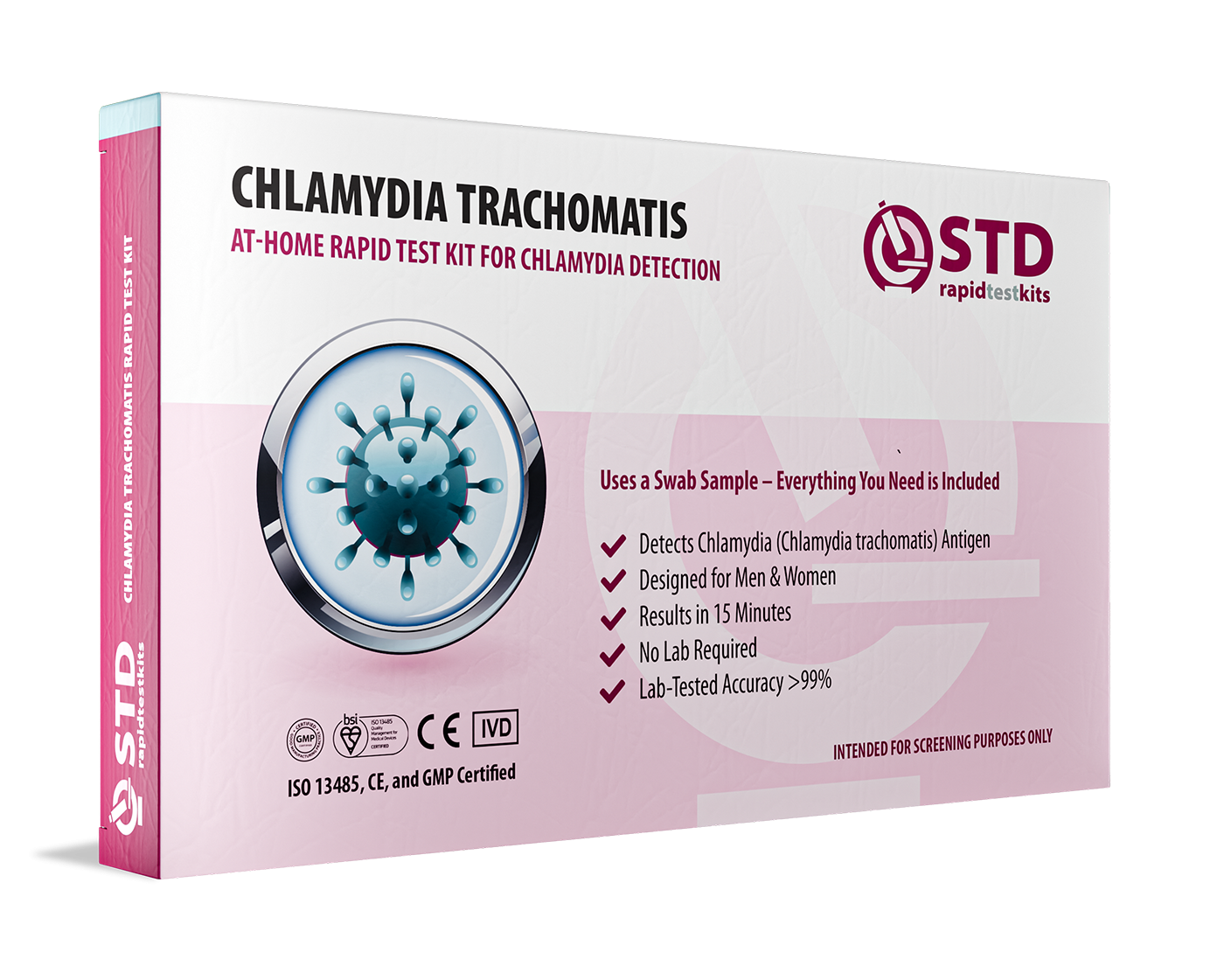Chlamydia as a Couple’s Disease? Kind Of.
It’s not officially labeled a “couple’s condition,” but maybe it should be. Why? Because chlamydia doesn’t just live in the body, it lives in the space between bodies.
Infections bounce back and forth not because someone is dirty or dishonest, but because:
- One partner was asymptomatic and never got tested
- One assumed the other had been treated
- There was sex too soon after treatment
- There was a new outside partner (yes, cheating, but not always)
The result? Chlamydia becomes a recurring guest star, and often the spark for blame, mistrust, and even breakup-level fights.
The Ping-Pong Effect
This is the clinical term, and it’s as irritating as it sounds. One partner treats. The other doesn’t. You have sex again. The bacteria gets passed back like a bad habit.
According to the CDC, up to 20% of chlamydia cases are reinfections within the first few months. And in committed relationships, it’s often due to:
- Delayed or refused testing by one partner
- Lack of follow-up after treatment
- Miscommunication about timing or exclusivity

People are also reading: Trichomoniasis: The STD No One Talks About
But I Trusted Them, Why Did I Get It Again?
This question stings. Because trust is fragile, and STIs are often loaded with emotional baggage. But let’s get one thing clear:
Consider this real-life example:
Chris (32) and Monica (28) had been dating for eight months. She tested positive for chlamydia during a routine screening and told Chris immediately. He promised to get treated… but never did. He had no symptoms, felt awkward about going to a clinic, and didn’t want to talk about it again.
Two months later, Monica tested positive again. “I thought he cheated,” she said. “But it turns out he just... didn’t go.”
Shame Is a Hell of a Barrier
Many people, especially men, avoid getting tested due to stigma, fear, or plain denial. They don’t want to feel dirty. They don’t want to admit something’s wrong. And that silence? It keeps infections alive.
According to a 2022 study in the International Journal of STD & AIDS, the top reasons for avoiding STI testing included:
- Fear of judgment from healthcare providers
- Embarrassment about perceived promiscuity
- Belief that no symptoms = no infection
This is why at-home testing is such a game-changer. No judgment. No small talk. Just answers.
Check Your STD Status in Minutes
Test at Home with RemediumChlamydia Test Kit

 For Men & Women
For Men & Women Results in Minutes
Results in Minutes No Lab Needed
No Lab Needed Private & Discreet
Private & DiscreetOrder Now $33.99 $49.00
How to Stop the Chlamydia Cycle (Without Destroying the Relationship)
Here’s the uncomfortable truth: recurrent chlamydia is often less about biology and more about communication breakdowns.
If you're stuck in the blame spiral, here's how to get out, together.
Test Together, Not Separately
Testing as a couple takes the pressure off “who gave who what” and reframes the moment as a mutual health check, not a morality quiz.
At-home kits can help take the embarrassment and logistics out of it. It’s easy to say: “Hey, let’s both do one of these just to be safe.”
This simple act can stop the ping-pong game cold, and give both people a fresh, honest baseline.
Understand the 7-Day Rule
Chlamydia doesn’t disappear instantly. Even after treatment, you must wait at least 7 days before having sex again. Why?
- Residual bacteria: Antibiotics take time to fully clear the system
- High reinfection window: Sex too soon = bacteria re-entry, even if both were treated
- Testing accuracy: Retesting too early can lead to false positives from dead bacterial DNA
The CDC recommends waiting a full week after finishing meds before resuming sexual activity, even with condoms.
Stop Saying “I Don’t Have Symptoms” Like It’s a Defense
This one’s tough love: chlamydia is asymptomatic in up to 75% of vulva-owners and 50% of penis-owners. Not feeling it doesn’t mean you’re clean.
Don’t let “I feel fine” be your reason to avoid testing. That’s how infections spread, and how relationships implode from false assumptions.

People are also reading: Trichomoniasis: The STD No One Talks About
Case Study: The Couple That Blamed Each Other (But Were Both Wrong)
Elena (29) and Travis (33) were exclusive for over a year. Then Elena tested positive for chlamydia during her annual Pap.
“He was furious,” she said. “He thought I cheated. I thought he gave it to me.”
Turns out? Neither had cheated. Travis had been infected before the relationship, never tested, and assumed he was clean because he had no symptoms.
Elena’s infection was just… dormant. Until it wasn’t.
The Lesson
“It almost ended our relationship,” she admitted. “We both had shame but no information. Now we test together every 6 months. No more surprises.”
Not every couple is as lucky. This bacteria can’t talk, but it’ll say everything you’ve been avoiding.
When Monogamy Becomes a Medical Trap
This part might sting a little.
People in monogamous relationships are often less likely to test for STDs, because they trust their partner. But trust doesn’t stop bacteria. And unspoken histories don’t vanish when you say “exclusive.”
- Most chlamydia cases are diagnosed during routine screenings, not because of symptoms
- Many “monogamous” relationships begin after casual encounters, where partners may never have tested in between
The result? One partner has been carrying chlamydia for months (or years), silently, and doesn’t even know they’re the source.
Common Myths That Wreck Relationships (More Than Chlamydia Does)
Let’s break down the false beliefs that destroy trust faster than any bacteria:
Myth: If you gave me an STD, you must’ve cheated.
Truth: Not always. Chlamydia can remain in the body silently for months or even years.
Myth: I didn’t feel anything, so I must be fine.
Truth: Most people with chlamydia feel nothing. No symptoms ≠ no infection.
Myth: Monogamous couples don’t need to test.
Truth: You still carry past exposures into the relationship. Trust isn’t a substitute for screening.
Myth: Testing = accusation.
Truth: Testing is protection, not punishment. It's an act of care, not suspicion.
Check Your STD Status in Minutes
Test at Home with Remedium6-in-1 STD Rapid Test Kit

 For Men & Women
For Men & Women Results in Minutes
Results in Minutes No Lab Needed
No Lab Needed Private & Discreet
Private & DiscreetOrder Now $119.00 $294.00
For all 6 tests
When Talking About Chlamydia Feels Scarier Than the Test
Sasha, 28, still remembers the tremor in her voice when she said the words out loud: “I think I might have chlamydia.” Her boyfriend was sitting three feet away on their faded blue couch, scrolling his phone, unaware that her chest felt like a drumline. She’d Googled her symptoms for days, swinging between certainty and denial, but the thought of the conversation felt worse than the diagnosis itself. If you’ve been there, you know the swirl of dread, what if they blame me, or worse, leave?
Starting that dialogue is a form of intimacy most couples never anticipate. It’s one thing to share your favorite childhood memory or your Netflix password. It’s another to reveal that your body might be carrying an STD. Fear of judgment often makes people delay testing or treatment, but silence only deepens the wedge between partners. In reality, acknowledging a possible infection can strengthen trust if it’s approached with honesty and a shared problem-solving mindset.
Turning the Awkward Talk Into a Team Moment
The key is shifting the narrative from accusation to collaboration. Instead of opening with, “I think I got this from you,” try framing it as a joint health check. “I noticed some unusual discharge and did some reading, chlamydia can be silent. I think we should both get tested.” That subtle change turns the moment from blame into teamwork.
Imagine this: your partner sets down their phone, brows furrowed. There’s a pause, maybe even a nervous laugh. They admit they’ve been scared too, or that they had a past partner they never got tested after. Suddenly, you’re not in opposite corners; you’re on the same side of the ring, facing the infection, not each other, as the opponent. And once testing is on the table, the anxiety often eases. Because the not knowing is heavier than the truth.
Creating a Post-Test Game Plan Together
If your results come back positive, the next chapter doesn’t have to be an emotional collapse. Chlamydia is treatable with antibiotics, usually in a single course, but the conversation about trust and future boundaries lingers longer. Couples who navigate this well often treat the experience as a reset button: recommitting to honest sexual health conversations, scheduling follow-up tests, and discussing protection moving forward.
Some partners even find relief in the structure. Instead of a murky “we should be careful,” they have concrete steps: finish the meds, abstain for the recommended window, and retest to confirm the infection is gone. A shared plan turns a reactive crisis into proactive care. And if you’re using an at-home chlamydia test together, that act itself can become bonding, like making pancakes on a Sunday, except the reward is peace of mind instead of carbs.

People are also reading: Dating Again at 45? The STD Risk No One Warns You About
What This Chapter Really Means for Your Relationship
In the long arc of intimacy, a bout of chlamydia can become a surprising pivot point. For some, it triggers overdue conversations about monogamy, past partners, or hidden fears. For others, it cements that the relationship can handle unglamorous realities without shattering. The couples who weather it best are the ones who treat sexual health as a shared responsibility, not a solo burden or secret shame.
When Sasha and her boyfriend got their results, both positive, they spent a quiet night on that same couch, sipping tea, watching a bad movie, antibiotics on the coffee table. She remembers feeling something unexpected: lighter. “It was awful and intimate and kind of funny,” she says now. “I realized if we could get through this, we could probably get through anything.”
FAQs
1. Can we give each other chlamydia back and forth?
Yes. This is known as the “ping-pong effect.” One untreated partner = reinfection cycle.
2. Is chlamydia proof of cheating?
Not always. It can be a silent infection from months ago, especially if neither partner tested at the beginning.
3. We both got treated. Why did it come back?
You may have had sex too soon, or one partner didn’t take their meds properly. Retesting helps confirm clearance.
4. My partner refuses to test. What now?
That’s a red flag. Respect, not fear, should guide sexual health. Offer an at-home kit as a no-pressure option.
5. Can I get reinfected even with condoms?
Yes, especially during oral or if condoms aren’t used 100% of the time.
6. Will one test clear both of us?
No. Each partner needs their own test and treatment, no exceptions.
7. Should we get a full STD panel?
Yes. Chlamydia often co-occurs with gonorrhea and other STIs. Use a combo kit to be thorough.
8. Can chlamydia damage fertility without symptoms?
Absolutely. Untreated chlamydia can cause scarring, PID, and infertility, often silently.
9. Is it safe to have sex after treatment?
Yes, but wait at least 7 full days after finishing meds, and make sure both partners were treated.
10. Should we keep testing even if we're monogamous?
Yes. Past exposure, long incubation, and false assumptions can make STIs show up later.
The Boldest Thing You Can Do for Love? Test Together.
Love doesn’t mean never getting an STD. It means knowing what’s in your body, and what you’re sharing.
If you keep passing chlamydia back and forth, it’s not a trust issue. It’s a silence issue. One that can be solved by a few clicks, a quick test, and a real conversation.
Protect each other. Don’t play the blame game. Play the facts game.
You’re not dirty. You’re informed. And that’s a better foundation for intimacy than blind trust ever was.
Sources
1. Caring for the Ages – Rising STIs Among Older Adults (CDC Data)
2. CIDRAP – STI Cases Rose 5% (2020‑2023), Biggest Jumps in Older Adults
3. Verywell Health – STDs in Older Adults: Hidden Risks & Misdiagnosis
4. The Lancet Healthy Longevity – STI Incidence Doubled in 65+ Adults
5. ASHA – STIs Are Not Just for the Young: CDC Data on 55+
6. University Hospitals – Why STIs Are Rising in Older Adults










